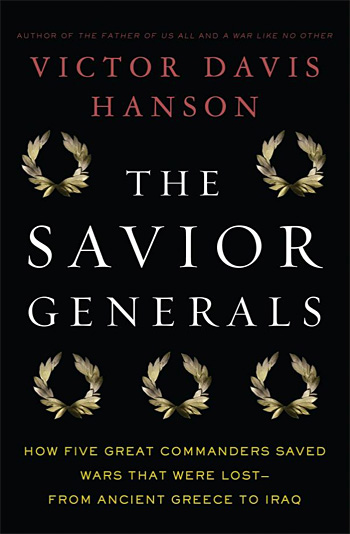 The Savior Generals is an incredible perspective of a unique set of generals: five men who saved wars that were lost. While military commanders such as Napoleon, Washington, or Eisenhower all deserve their due, the five chosen for this book all came into wars at the point where they were all but lost and salvaged incredible victory from certain defeat.
The Savior Generals is an incredible perspective of a unique set of generals: five men who saved wars that were lost. While military commanders such as Napoleon, Washington, or Eisenhower all deserve their due, the five chosen for this book all came into wars at the point where they were all but lost and salvaged incredible victory from certain defeat.
Themistocles – This ancient Athenian general saved classical Greek civilization from annihilation by the conquering Persian army. King Xerxes and his insurmountable Persian army had staged an invasion of Greece that simply seemed unstoppable. Themistocle’s foresight to raise an armada of Greek trirenes and his ability to draw Xerxes into a favorable naval battle won a war (and classic Western civilization) that all believed was lost.
Flavius Belisarius – By the time Belisarius enters into world history, the western portion of the great Roman Empire had long since rotted away. The eastern portion of Byzantium had stood for centuries but faced decline on all front. A general of the Emperor Justinian, Belisarius had a successful military career in the Middle East, North Africa, Asia and Europe that saw the empire expand in the face of profound opposition and ensure the longevity of the Byzantine Empire for another 900 years.
William Tecumseh Sherman – This side of history it’s too easy to assume that victory for the North was assured in the Civil War. Far from it. In the summer of 1864, with a presidential election coming in a few short months, virtually everyone had written off Abraham Lincoln’s reelection chances. The war had gone on for four years with no end in sight. Horrific battles such as Antietam wiped out tens of thousands of troops with nothing to show for it. Even the recent promotion of Ulysses S. Grant hadn’t seemed to turn the tide. Lincoln was dangerously down in the polls to the Democratic candidate, who was under pressure to make peace with the South (and continue slavery) upon election. The only thing that could salvage Lincoln’s reelection was a major victory. Sherman gave him just that. By marching successfully to Atlanta, occupying it, and destroying the second largest transportation hub in the South before Election Day gave Northerners the hope they needed to reelect Lincoln and see a successful end to the war.
Matthew Ridgway – In the winter of 1950, Korea was all but lost. The seesaw war had gone back and forth. Communist North Korea’s surprise attack had pushed the allies to the southern most tip of the peninsula. Only a daring attack by Douglas MacArthur turned the tide, with the Allies pushing the North Korean army to their border with China. Victory seemed to be assured. And then the Chinese army poured across the border with hundreds of thousands of soldiers. All momentum was lost. The allies were being pushed back. The capital of Seoul was lost again. The allies were contemplating evacuating the whole peninsula. Some even claimed the only way to win the war was to bomb China with nuclear weapons. And then Matthew Ridgway took command. By inspiring his troops and making sound tactical decisions, he turned around a war that all had assumed was lost.
David Petraeus – Iraq in 2007 was a deadly place to be. A three-week war quickly led to claims of victory by the Americans, but the unending sectarian violence and terrorist attacks slowly drained away the support for the war. By 2007, body counts were lining up, many said that Iraq was in the midst of a civil war, and foreign insurgents were pouring into Iraq to kill Americans. Everyone had given up on Iraq. Then President Bush approved a very controversial “surge” and the champion of it to command the forces in Iraq, General David Petraeus. Through a change in military tactics, Petraeus snatched victory from the jaws of defeat and helped the Americans conclude their war on somewhat favorable terms.
LESSONS LEARNED
1. These men exhibit greatness for securing victory from unenviable conditions. It’s one thing for a general to go in and win a war with better troops, training, and resources. It’s even more remarkable for men to stand up where others failed and achieve victories from what everyone assumed could only be defeats.
2. The backgrounds of these men were average at best. None of these generals graduated at the top of their class. Many had mediocre lives before their wars. For many, the wide-range of real world experiences and failures helped prepare them to meet conventional problems in unconventional ways.
3. The key to their success was how they dealt with people. One of the most fascinating things to discover was how strong people skills ran throughout these five generals. They walked into situations that many others had tried before and failed. When they turned around their wars, it wasn’t because of a new piece of technology. It wasn’t because of a massive wave of reinforcements. They simply knew how to treat people. They knew how to inspire their troops. They knew how to empower their subordinates. They knew how to treat the locals. With the advancement of technology and weaponry, the difference between success and failure many times comes down to how you deal with people.
An incredible lesson for the church can be drawn from this. For most pastors, success or failure is not determined by your training, your education, or your position. It comes down to how you treat people. If you can lead, inspire, and empower people, you will be successful.











